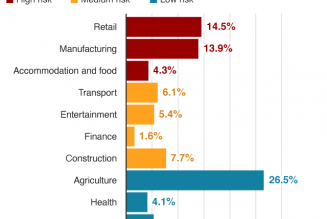
Green groups had sought to force the Interior Department to finish a post-Deepwater Horizon review of its practice of issuing offshore oil and gas drilling permits without first carrying out a site-specific environmental review. In her 2017 ruling, Jackson agreed Interior had an “ongoing obligation” to review its procedures, but ruled that department policy “does not mandate that an agency complete its ongoing review… much less demand that an agency publicly announce its decision to decline to revise its existing rules.”
Jackson’s ruling illustrates that she “comes to cases with an open mind and will rule based on the record and the law,” said Kristen Monsell, the Center for Biological Diversity attorney who argued the case.
“I obviously did disagree with the analysis and conclusion, but she did give us a fair hearing,” Monsell added.
Environmentalists are expected to coalesce behind Jackson as a replacement for Justice Stephen Breyer, as protecting his seat on the Supreme Court has become critical for liberal activists across the board.
If confirmed, Jackson would join a court that tilts decidedly to the right. Absent the departure of a conservative member, that could mean Jackson should expect to spend much of her time penning dissents, including for environmental cases.
Jackson clerked for Breyer — who will retire at the end of the court’s current term this summer and was known for seeking compromise solutions that could win votes from the court’s conservative wing — in the 1999-2000 term.
“If someone were to fill in exactly where Breyer is, she would be right there,” said Steph Tai, a law professor at the University of Wisconsin-Madison.
Jackson’s ruling against the environmentalists in the offshore drilling case “illustrated her ability to set aside her personal preferences to actually stick by the requirements of the Administrative Procedure Act, which, honestly, allows a lot of deference to agencies,” Tai added.
Jackson, 51, is best known for her experience in criminal law. She worked as a federal public defender in Washington, D.C., from 2005 to 2007, and from 2010 through 2014 she served as vice chair of the U.S. Sentencing Commission, a judicial agency that creates sentencing policies.
Jackson was confirmed as a district judge in 2013 by a voice vote. But her 2021 confirmation to the D.C. Circuit — widely seen as positioning her for the Supreme Court — was far more contentious. She ultimately garnered support from just three Republicans: Lisa Murkowski of Alaska, Susan Collins of Maine and Lindsey Graham of South Carolina. (She also enjoyed public backing from former Speaker Paul Ryan, to whom she is related by marriage.)
Jackson likely will have at least one high-profile environmental case waiting to welcome her to the high court this fall, should she be confirmed.
The Supreme Court in January agreed to take up an appeal questioning whether lower courts have applied the proper test for determining which wetlands are federally protected waters. That case appears to be headed for argument near the beginning of the court’s term in October.
However, Jackson’s replacement of Breyer probably wouldn’t shift the dynamics of that case. The six conservative justices likely have enough votes to rule without needing the support of the court’s diminished liberal wing.
In many of her environmental rulings during her eight years in district court, Jackson relied on facts unique to the case or statutory limitations.
“She’s very fact-based, she’s very multiple-factor-based,” said Tai. “And to the extent that the multiple factors come out against the environmentalists, she’s fine with ruling that way.”
One of her highest profile rulings involved environmentalists’ challenge to the Trump administration’s waiver of key environmental laws in constructing the Mexican border wall. In 2019, Jackson ruled that a 1996 law blocked judicial review of the groups’ challenge, and thus prevented her from weighing in on their claims that the administration had overstepped its authority.
Early in her time as a judge, Jackson ruled against environmentalists challenging the Enbridge-owned Flanagan South Pipeline, which carries oil sands crude oil from Illinois to Oklahoma mostly across privately-owned land. The green groups argued the federal government should have conducted an environmental review of the entire pipeline, but Jackson ruled they were wrong.
“The Federal Defendants have permitting authority over only small segments of this private pipeline project and none of the defendant agencies, alone or in combination, have authority to oversee or control the vast portions of the FS Pipeline that traverse private land,” she wrote in 2014. The D.C. Circuit later affirmed her ruling.
In 2018, Jackson tossed out an Obama-era designation that established critical habitat for the Riverside fairy shrimp, an endangered species found only in a small part of California’s San Diego County. The Fish and Wildlife Service had named 56 acres of a developer’s property as critical habitat because it was adjacent to the small pools the shrimp occupy. “There is nothing about the [Endangered Species Act’s] use of ‘occupied,’ or the plain meaning of that term, or, quite frankly, common sense, that permits this result,” Jackson ruled.
And in 2015, Jackson rejected a lawsuit over a planning rule that industry challengers argued placed environmental interests over competing logging and grazing interests, concluding they lacked standing.
Jackson has sometimes ruled in favor of environmental interests.
In 2018, after environmental groups sued EPA over long-overdue updates to nine air pollution standards, Jackson rejected the Trump administration’s request for seven years to finish the rulemakings. Environmentalists asked for a two-year deadline, but Jackson called that timeline “impossibly compressed” and instead imposed a three-and-a-half year deadline. (Several of those deadlines have since been pushed back into 2022.)
Also that year, Jackson green-lighted a $160 million lawsuit brought by Guam against the Navy over Superfund clean-up costs of an old dump. She was reversed by the D.C. Circuit — but the Supreme Court reversed again on appeal in 2021, allowing Guam’s lawsuit to proceed to trial, as Jackson had initially ruled.
Jackson also briefly oversaw challenges to the Trump Transportation Department’s rule that prohibited California and other states from setting more stringent greenhouse gas standards for vehicles. That case never advanced very far, and the Biden administration has since repealed that regulation.
Since joining the D.C. Circuit last year, Jackson’s participation in energy and environmental cases has skyrocketed — but her short time on the appellate bench means she’s signed her name to few rulings.
In January, Jackson heard environmentalists’ challenge to the Trump administration’s environmental review that underpinned two lease sales in the Gulf of Mexico in 2018. Jackson and Judge Robert Wilkins expressed concerns about the environmental impact statement. She specifically went after the Bureau of Ocean Energy Management for not addressing the Bureau of Safety and Environmental Enforcement’s planned changes to the well control rule, which tightened standards for the equipment used to drill and produce oil and gas from underwater wells.
“I’m concerned about the suggestion that the agency doesn’t have to take that into account, if it relies on those rules, when it’s putting together an EIS,” Jackson said during oral arguments. The court has not yet ruled in that case, but Wilkins indicated he was inclined to vacate the leases.
Also in January, Jackson joined a ruling that found the Trump administration had not provided “clear and convincing evidence” to justify the increased stringency of an energy efficiency rule for boilers used in commercial or multifamily buildings. DOE has until April to provide a fuller explanation for the standard; if it does not, the regulation will be vacated.
Jackson sat on a panel in November that heard a tribal challenge to the Nuclear Regulatory Commission’s licensing of a South Dakota uranium mine. That panel has not yet ruled, but during arguments, Jackson seemed disinclined to second guess the licensing board. “Ordinarily, we give deference to an agency in its determination of fact, particularly after a lengthy evidentiary hearing,” she said.
In her short time on the D.C. Circuit, Jackson has heard seven different FERC lawsuits. Only two have led to rulings so far — including one issued on Thursday, unusual timing for an opinion release that stirred speculation that Jackson was trying to clear her docket before a nomination announcement.
[flexi-common-toolbar] [flexi-form class=”flexi_form_style” title=”Submit to Flexi” name=”my_form” ajax=”true”][flexi-form-tag type=”post_title” class=”fl-input” title=”Title” value=”” required=”true”][flexi-form-tag type=”category” title=”Select category”][flexi-form-tag type=”tag” title=”Insert tag”][flexi-form-tag type=”article” class=”fl-textarea” title=”Description” ][flexi-form-tag type=”file” title=”Select file” required=”true”][flexi-form-tag type=”submit” name=”submit” value=”Submit Now”] [/flexi-form]









